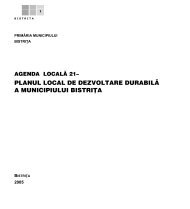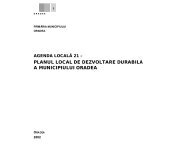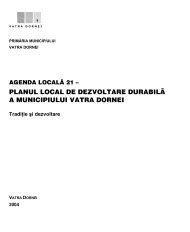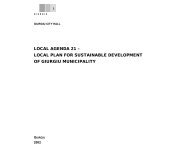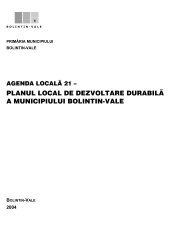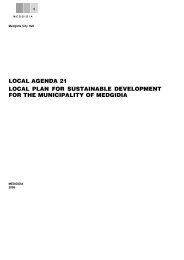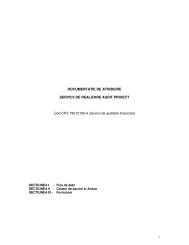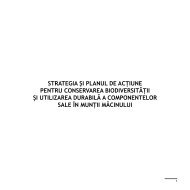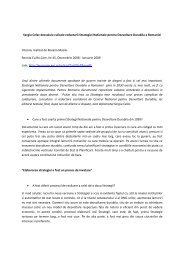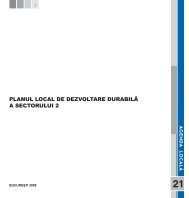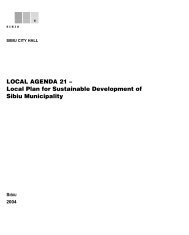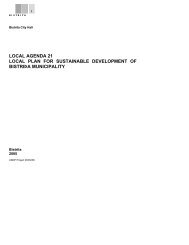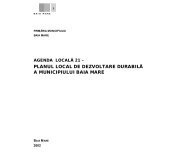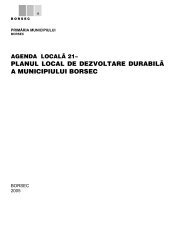English Version - United Nations Development Programme Romania
English Version - United Nations Development Programme Romania
English Version - United Nations Development Programme Romania
You also want an ePaper? Increase the reach of your titles
YUMPU automatically turns print PDFs into web optimized ePapers that Google loves.
<strong>Romania</strong>'s sustainable development in the next century will depend considerably on the following<br />
factors: reconsidering the investment in human capital development at all levels of the socio-economic<br />
system; encouraging the motivation for permanent education and learning by ensuring the use and<br />
appropriate remuneration of acquired skills; strengthening the achievements of the education reform,<br />
including the new institutions created in 1998; ensuring that the legal and institutional framework is<br />
compatible with that of other European countries, and that it can produce, evaluate, and certify acquired<br />
competence on the basis of measurable performance criteria.<br />
2.3. Economic Growth<br />
2.3.1 Among the Central and Eastern European countries, <strong>Romania</strong> shows a series of favouring<br />
features which, if put to good use, could support sustainable development on a long term. Among these,<br />
the following are relevant: a) natural capital, despite aspects of significant destruction and overexploitation<br />
which is due to the lack of conservation and protection in the past; b) human capital, seen<br />
from a quantitative and qualitative point of view, <strong>Romania</strong> being the second largest country in Central<br />
and South-eastern Europe in terms of population with a relatively larger proportion of young people, a<br />
more balanced structure on age groups; cheaper labour force; a satisfactory level of training, although this<br />
comparative advantage is beginning to disappear, due to a delay in harmonisation with European<br />
standards of qualification; c) political stability, by comparison with other countries in the area, where<br />
acute and latent conflicts are currently developing.<br />
For <strong>Romania</strong>, the transition towards a market economy has proved more complex and longer than<br />
expected. <strong>Romania</strong> had a difficult start as compared to other countries in the region, caused partly by the<br />
critical economic situation perpetuated from the past and partly by the planning, coherence and<br />
implementation pace of the reform. In this situation, the existing imbalance (between supply and demand,<br />
structural, territorial, etc.) became more acute; some of the mechanisms failed; the new financial and<br />
economic institutions did not reach the degree of maturity necessary for the normal functioning of a<br />
market economy, for the creation of the conditions needed for a sustainable economic development.<br />
Neither the signals, nor the aid received from abroad did rise meet the country's needs; in other cases they<br />
have only partially been used.<br />
In the economic field, a series of noticeable achievements can be cited:<br />
The creation of an institutional framework for the market economy, though the normative and<br />
regulatory acts still have to be completed to help create an integrated market system, in accordance<br />
with the new economic conditions and in keeping with the requirements for economic integration;<br />
Liberalisation and creation of an externally-oriented economy (liberalisation of prices, of foreign<br />
trade, cutting subventions); allowing the laws of the market to play a more significant role in the<br />
economy, thus limiting the amount of government administration and intervention;<br />
Introduction of a variety of forms of ownership, privatisation and economic restructuring. In 1998,<br />
the private sector accounted for 58.4% of the GDP; 29.8% in industrial production; 90.5% in<br />
agricultural production; 78.2% in building operations; 49% in foreign trade; 90.6% in retail trading<br />
and 54.2% in commercial services for the population. In 1998, 56.5% of the workforce was employed<br />
in the private sector;<br />
Decentralisation of the decision act increased local autonomy, elimination of monopolies,<br />
subsidiarity. <strong>Development</strong> of social partnership relations, including the creation of institutions and<br />
special forums which work in a tripartite regime.<br />
2.3.2 <strong>Romania</strong>'s economic situation and development are far from meeting the requirements of a<br />
sustainable development. During the last ten years, the structural crisis and the inherited unbalances, the<br />
delay of the economic and institutional reform, the incoherence and incongruities and gaps between the<br />
components of the economic reform, between the nominal and real economy, have caused a prolonged<br />
decline of the country. The hectic and destructive use of resources has also contributed to this situation.<br />
The impact on the environment was most severe: on the one hand, wasteful use of resources has become<br />
chronic, and on the other, the economy, continually impoverished, can hardly cover the costs for the<br />
protection of the environment - though they are relatively low, as compared to those in the developed<br />
countries. The evolution of the economy is marked by distortions, with a strong note of nonsustainability.<br />
The economic development is marked by a prolonged crisis, by a growing vulnerability, both<br />
facts that widen the gap between <strong>Romania</strong> and the developed countries.<br />
In economy, some strong tensions and pressures were amplified and accentuated:<br />
a) Unbalance between production and consumption, the latter being constantly higher,<br />
between factors of production and economic efficiency and performance. The delay in the reform of the<br />
real economy, in the restructuring of companies causing losses, in solving the financial blocking, of<br />
14



